- Home
- Pearl S. Buck
East Wind: West Wind: The Saga of a Chinese Family Page 2
East Wind: West Wind: The Saga of a Chinese Family Read online
Page 2
Sometimes my mother would weary of this woman’s empty vanity and a little maliciously would bid her do some coarse washing or sewing. The fat Second Lady dared not disobey, but she whined and complained secretly to the other concubines that my mother was jealous of her and wished to spoil her beauty for my father. This she said, nursing her hands the while and examining them with the greatest care to see if the delicate skin were at all bruised or thickened. I could not bear to touch her hands; they were hot and soft and melted in one’s grasp.
My father had long since ceased to care for this woman, but he gave her money when he came and spent a night in her apartment, lest she cry in a loud voice in the courts and tease him with her reproaches. She had, moreover, two sons and thus was entitled to some attention.
Her sons were fat and exactly resembled their mother, and I do not bring them to mind except as eating and drinking continually. They ate fully at the table with the others, yet afterwards they would creep away into the servants’ courtyard and quarrel with the servants for the left-over bits. They went about always with great cunning, fearing my mother, who hated above all else greed for food. She herself never ate more than a bowl of dry rice with a bit of salted fish or a thin slice of cold fowl and a sip of scented tea.
I do not remember more about the Second Lady except that she was always much afraid of dying. She ate many sweet oily sesame cakes and, when she fell ill, lay groaning in great terror. Then she would call in the Buddhist priests and promise her pearl hair ornaments to the temple if the gods would make her well. But when she was well again she continued to eat cakes and feigned to forget the promise.
The second concubine, the Third Lady, was a dim woman, who spoke seldom and took little interest in the family life. She had five children, all girls except the youngest; and this had weakened her spirit and made her disconsolate. For the girls she cared nothing. They were neglected and held little higher than the slaves we bought for service. She spent her time in a sunny corner of the courtyard nursing the son, a heavy, sallow child, three years old and still unable to talk or walk. He cried a great deal and was forever dragging at her long, flabby breasts.
The concubine I liked best was the third, a little dancing girl from Soochow. Her birth name was La-may, and she was as pretty as the la-may flower itself, which puts out its pale gold blossoms from leafless branches in early spring. She was like them, dainty and pale and golden. She used to put no paint on her cheeks as others did, but only an emphasis of black on her narrow eyebrows and a touch of vermilion on her lower lip. We saw very little of her at first, for my father was proud of her beauty and took her with him everywhere.
The last year before my marriage she had been at home, however, waiting for her son to be born. He was a lovely boy, chubby and handsome, and she took him and laid him in his father’s arms. Thus she repaid what he had given her of jewels and affection.
Before the child’s birth the Fourth Lady had been in a continual mood of high excitement and tinkling laughter. Everywhere she was praised for her beauty; and indeed, I have never seen a loveliness to surpass hers. She wore jade-green satins and black velvet, with jade in her exquisite ears, and she scorned us all a little in spite of her careless generosity with the cakes and sweetmeats given her at the feasts she attended nightly with my father. She seemed to eat almost nothing herself—a sesame cake in the morning, after my father had left her, and at noon half a bowl of rice with a bit of bamboo shoot or a thin slice of salted duck. She loved foreign wines and coaxed my father to buy her a pale yellow liquid with silver-pointed bubbles darting upward from the bottom. It made her laugh and become very talkative and her eyes sparkle like black crystals. Then she amused my father exceedingly, and he would bid her dance and sing for him.
But when my father feasted, my mother sat in her own apartment reading the stately sayings of Confucius. As for me, when I was a young girl I often wondered at those feast nights and longed to peep, as I once had when I sought my brother, between the carved crevices of the moon-gate into the men’s apartments. But my mother would never allow it, I knew, and I was ashamed to deceive her.
One night, however—I am filled with shame now at my unfilial disobedience!—I crept secretly through the blackness of a moonless summer night and gazed again through the gate and saw into my father’s apartments. I do not know why I did it—I no longer thought of my brother. Some strange fullness of vague desire had made me restless throughout the long hot day, and when the night came, filled with warmth and dusk and the thick scent of lotus flowers, the quietness of our women’s rooms seemed a thing dead of itself. My heart beat hard as I gazed. The doors were flung wide and the light from a hundred lanterns streamed out into the hot, still air. Within I saw men sitting at square tables eating and drinking and servants hurrying back and forth with food. Behind each man’s chair stood the vine-slender figure of a girl. But seated at my father’s side, the only woman at the table, was La-may. I could see her quite clearly, her face smiling a little, shining like a wax-petaled flower, as it turned to my father. She said something in a low voice, scarcely moving her lips, and a roar of laughter went up from the men. Her smile was unchanged, slight, subtle, and she did not laugh.
This time my mother herself discovered me. She seldom left the house even to walk in the courts, but the heat of the night had driven her forth, and her sharp eyes discerned me immediately. She commanded me to retire at once to my room and following me there she slapped the palms of my hands sharply with her folded bamboo fan and asked me scornfully if I desired to see harlots at their work. I was ashamed and wept.
The next day she ordered opaque shell lattices to be placed over the moon-gate, and I never looked through it again.
But my mother was none the less kind to the Fourth Lady. The servants praised her loudly for this forbearance, although I think the other concubines would have been glad to see her cruel, as a first lady so often is to the others. Perhaps my mother knew what was in store.
After her baby was born, the Fourth Lady thought that of course my father would take her about with him again. She did not nurse the child herself lest she spoil her beauty. Instead she gave him to a sturdy slave-woman, whose child, a girl, had of course not been allowed to live. This slave was a thick-bodied woman with a foul mouth, but the little boy slept in her bosom all night, next her flesh, and was carried in her arms all day. His own mother paid little attention to him, except to dress him in red on a gala day and put little cat-faced shoes upon his feet and play with him a brief while. When he cried, she thrust him impatiently back into the slave’s arms.
But the boy gave her an insufficient hold upon my father. Though legally she had repaid him, she had daily to seek cunning devices to capture his senses, as our women have ever had to do. Even her cunning, however, was not enough. She was not so beautiful as she had been before the child’s birth. Her smooth, pearly little face sagged just enough to take away her delicate youth. She dressed herself in her jade-green gown and hung pendants in her ears and gave her little tinkling laugh. My father appeared as pleased with her as ever; only, when he went on his next journey he did not take her with him.
Her astonishment and rage were dreadful to see. The other concubines were secretly pleased and smiled a great deal as they pretended to comfort her. My mother was a little kinder to her than usual. I heard Wang Da Ma mutter angrily,
“Oh, yes, now we shall soon have another idle woman to feed. He is weary of this one already!”
From that day the Fourth Lady brooded. She became discontented, with fits of irritability and profound weariness of the humdrum existence in a women’s courtyard. She had been used to the feasting and the admiration of men. She became very melancholy, and later even tried to throw away her own life. But that was after my marriage. It is not to be supposed from all this that our life at home was a sad one. It was really very happy, and many of our neighbors envied my mother. My father had never ceased to respect her for her intellect and for her capable ma
nagement of his affairs. She never reproached him for anything.
Thus they lived in dignity and peace.
O my beloved home! My childhood passes before me in pictures illumined as by firelight. The courtyards, where I watched the lotus-buds burst into flower in the pool at dawn, and the peonies bloom in their terraces; the family rooms, where the children tumbled on the tiled floor, and the candles flared before the house-gods; my mother’s room, where I see her stern, delicate profile bent over a book, the huge canopied bed in the background.
Most dear of all is the stately guest-hall, with its ponderous black teak couches and chairs, the long carved table and the scarlet satin curtains in the doorways. Above the table hangs a painting of the first Ming emperor—an indomitable face with a chin like a stone cliff—and on each side of this painting hang the narrow scrolls of gold. The whole south side of the hall is in carved window frames, latticed with rice-paper. This paper sheds a soft moonstone light over the dark dignity of the room, reaching even to the heavy beams of the ceiling and lighting up the vermilion and the gold of their painted edges. To sit quietly in this hall of my ancestors and watch the twilight fall upon it in dusky silence has ever been to me like music.
On the second day of the New Year, which is the day for great ladies to call upon one another, the hall is delicately gay. Into its dim age comes a host of brilliantly dressed ladies; there is light and laughter and bits of formal talk, and the slaves pass tiny cakes in red lacquered sweetmeat trays. My mother presides over it all with grave courtesy. The old beams have looked down upon the same scene for hundreds of years—black heads and dark eyes, rainbow silks and satins, jade and pearl and ruby hair ornaments, and turquoise and gold flashing upon slender ivory hands.
O my beloved home—O dearly beloved!
I see myself, a little solemn figure clinging to my brother’s hand, standing beside the fire in the court, where the kitchen-gods are about to be burned. They have had honey put on their paper lips so that they may ascend to heaven with sweet words and forget thus to tell of the times when the servants quarreled, and when they stole food from the bowls. We are filled with awe at the thought of the messengers to the distant unknown. We do not speak.
I see myself on the Dragon Festival, with my best feast-day gown of pink silk embroidered with plum blossoms, scarce able to wait until evening when my brother will take me to see the dragon boat upon the river.
I see the bobbing lotus lantern that my old nurse brings me at the Feast of Lanterns, laughing at my excitement when night comes and I may light the smoky red candle within.
I see myself walking slowly beside my mother into the great temple. I watch her place the incense in the urn. I kneel reverently with her before the god, and fear is cold within me.
I ask you, My Sister, with years like this to shape me, how have I been prepared for such a man as my husband? All my accomplishments are of no avail. I plan in secret that I will wear the blue silk coat with black buttons cunningly wrought in silver. I will place jasmine in my hair, and upon my feet the pointed black satin shoes embroidered in blue. I will greet him when he enters. But when it has all come to pass, his eyes escape hastily to other things—his letters upon the table, his book. I am forgotten.
Within my heart is a writhing fear. I remember a day before my marriage. It was the day on which my mother wrote two letters swiftly with her own hand, one to my father and one to my future mother-in-law, and dispatched them in great haste by the old gate-keeper. I had never seen her so perturbed. On that day I heard the servants whisper that my betrothed wished to break our engagement because I was uneducated and had bound feet. I burst into tears, and the servants were frightened and swore that it was not I of whom they spoke, but of Lady Tao’s fat second daughter.
Now I remember this and ponder it in great agitation. Could it have been I? Servants are ever liars! Yet I am not untaught. I have been carefully trained in all household matters and in the care of my person. As for my feet, surely no one could prefer huge, coarse ones like those of a farmer’s daughter. It was not I—it cannot be I—of whom they spoke!
III
WHEN I HAD SAID farewell to my mother’s home and stepped into the great red chair to be carried to the home of my husband, I never dreamed I should not please him. For myself, I remembered and was glad that I am small and lightly framed, with an oval face that others are pleased to look upon. At least here he would not be disappointed.
During the wine ceremony I stole a glance at him from under the red silken strands of my veil. I saw him standing there in his stiff, black, foreign clothes. He was tall and straight like a young bamboo. My heart went cold and hot together. I was sick for his secret glance. But he did not turn his eyes to pierce my veil. We drank the cups of wine together. We bowed before his ancestral tablets. I knelt with him before his august parents. I became their daughter, leaving forever my own family and clan. He never looked at me.
That night, after the feasting and bantering laughter had ended, I sat alone upon the couch in the bridal chamber. I was stifled with my fear. The hour I had imagined and dreaded and longed for all my life was come—the hour when for the first time my husband looked on my face, and we were alone together. My cold hands were pressed against each other in my lap. Then he came in, still so tall and somber in those dark foreign clothes. He came to me at once, and in silence he lifted the veil from my face and looked long upon me. Thus he acknowledged me. Then he took one of my cold hands. The wisdom of my mother had taught me thus:
“Be chill, rather than warm. Be the tang of wine rather than the surfeiting sweetness of honey. Then his desire will never fail.”
Therefore I was reluctant to give him my hand. Instantly he withdrew his own and gazed at me in silence. Then he began to speak with grave earnestness. At first I could not comprehend his words for the marvel of his voice in my ears, a quiet, deep man’s voice that made my body flush with shyness. Then I caught his words with astonishment. What was he saying?
“It is not to be supposed that you would be drawn to me whom you behold for the first time, as I behold you also. You have been forced into this marriage as much as I have. We have been helpless in this matter until now. Yet now that we are alone we may create our life according to our own desires. For myself, I wish to follow the new ways. I wish to regard you in all things as my equal. I shall never force you to anything. You are not my possession—my chattel. You may be my friend, if you will.”
These were the words I heard on my bridal night. At first I was amazed beyond understanding of their meaning. I equal to him? But why? Was I not his wife? If he did not tell me what to do, then who would? Was he not my master by law? No one had forced me to marry him—what else could I do if I did not marry? And how could I marry except as my parents arranged it? Whom could I marry if not the man to whom I had been betrothed all my life? It was all according to our custom. I did not see wherein lay any force.
Then his words burned again in my ears. “You have been forced into this as much as I have.” I was suddenly faint with fear. Did he mean to say he did not wish to be married to me ?
O My Sister, such anguish—such bitter pain!
I began to twist my hands in my lap, not daring to speak, not knowing how to reply. He placed one of his hands over both of mine, and we were silent for a while. But I only wished that he would take his hand away. I felt his eyes on my face. At last he spoke, his voice low and bitter,
“It is as I feared. You will not—cannot—show me your real mind. You dare not break away from what you have been taught you should say and do at this time. Listen to me—I do not ask you to speak. But I beg of you this small token. If you are willing to try the new path with me, bend your head a little lower.”
He watched me closely; I could feel his hand pressing down steadily. What did he mean? Why could not things proceed in the expected way? I was ready to be his wife. I desired to be the mother of sons. Oh, then my sorrow began—this heaviness that never leaves me by
day or night! I knew not what to do. And in my despair and ignorance I bent my head.
“I am grateful,” he said, rising to his feet and removing his hand. “Rest quietly in this chamber. Remember you will have nothing to fear, now or ever. Be at peace. I will sleep this night in the little chamber adjoining.”
He turned swiftly and went away.
O Kwan-yin, Goddess of Mercy, pity me—pity me! Such a child—so young, so terrified in my loneliness! Never had I slept away from my home before. Now to lie in solitude, knowing at last that I found no favor in his eyes!
I ran to the door, thinking in my wildness that I might escape and return to my mother’s home. But my hand upon the heavy iron bar recalled me. For me there could never be any return. Even though by miracle I escaped through the unknown courtyards of my new home, there was the strange street; even though by miracle I found my way to the familiar gate, it would never open to receive me. If my voice moved the old gateman so that he allowed me to stumble through the doors of my childhood, my mother would be there waiting to send me back to my duty. I could see her, inexorable, sorrowful, commanding my instant return to my husband’s house. I no longer belonged to her family.
I took off the wedding garment slowly then and folded it away. I sat for a long time on the edge of the great curtained bed, fearing to creep into the shadows within. His words tumbled madly about in my mind without meaning. At last tears rushed to my eyes, and I huddled under the coverings and sobbed for weary hours until a restless sleep fell lightly upon me.
At dawn I waked, at first in wonder as I saw the strange room, and then with a rush of miserable memory. I arose hastily and dressed myself. When the servant came in with the hot water, she smiled and glanced inquiringly about. I drew myself straight. I was glad I had learned dignity of my mother. At least no one should know that I had not pleased my husband. I said,

 Come, My Beloved
Come, My Beloved The Big Wave
The Big Wave The Patriot
The Patriot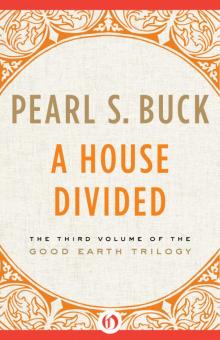 House Divided
House Divided The Good Earth
The Good Earth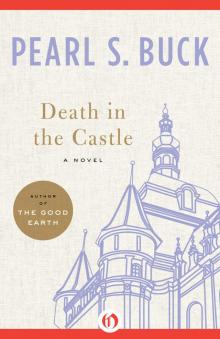 Death in the Castle
Death in the Castle The Eternal Wonder
The Eternal Wonder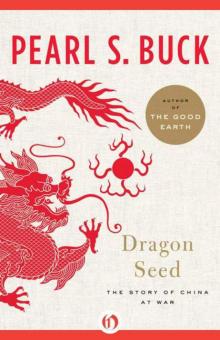 Dragon Seed: The Story of China at War
Dragon Seed: The Story of China at War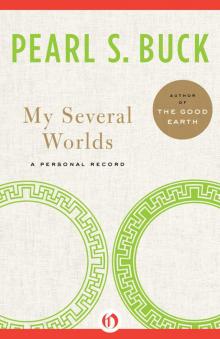 My Several Worlds: A Personal Record
My Several Worlds: A Personal Record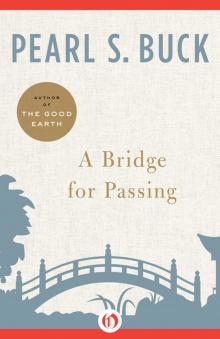 A Bridge for Passing: A Meditation on Love, Loss, and Faith
A Bridge for Passing: A Meditation on Love, Loss, and Faith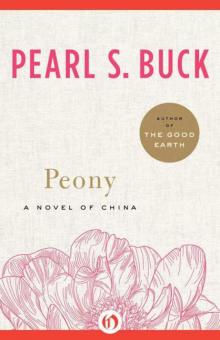 Peony
Peony East Wind: West Wind: The Saga of a Chinese Family
East Wind: West Wind: The Saga of a Chinese Family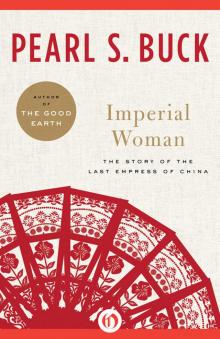 Imperial Woman
Imperial Woman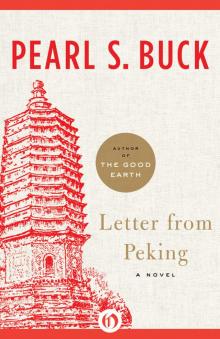 Letters From Peking
Letters From Peking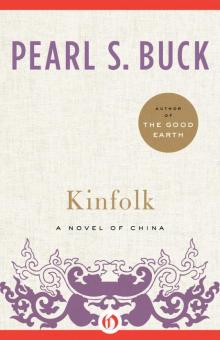 Kinfolk
Kinfolk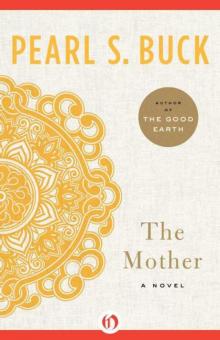 The Mother
The Mother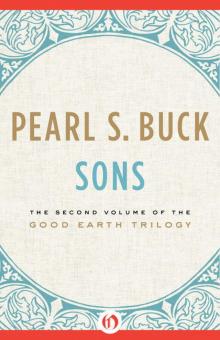 Sons
Sons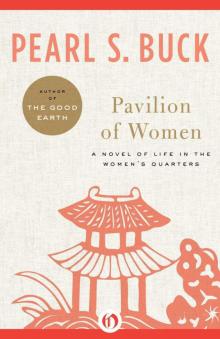 Pavilion of Women
Pavilion of Women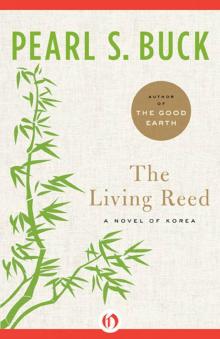 The Living Reed: A Novel of Korea
The Living Reed: A Novel of Korea The Big Wave: A Novel
The Big Wave: A Novel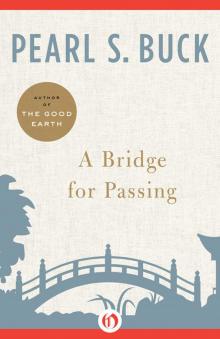 Bridge for Passing
Bridge for Passing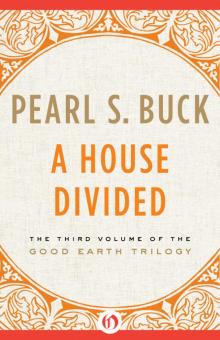 A House Divided
A House Divided Angry Wife
Angry Wife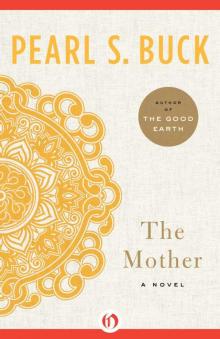 The Mother: A Novel
The Mother: A Novel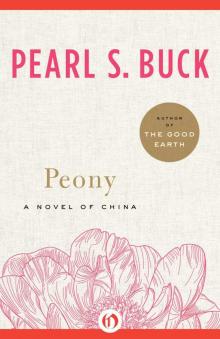 Peony: A Novel of China
Peony: A Novel of China East Wind: West Wind
East Wind: West Wind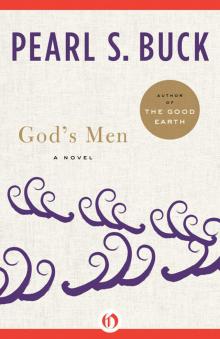 Gods Men
Gods Men Patriot
Patriot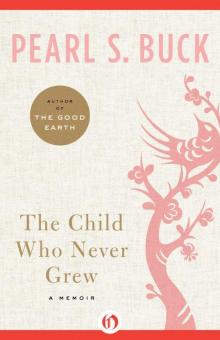 The Child Who Never Grew (nonfiction)
The Child Who Never Grew (nonfiction)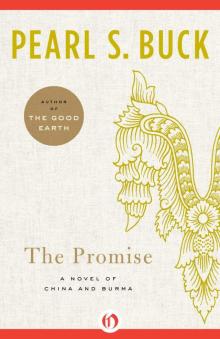 The Promise: A Novel of China and Burma (Oriental Novels of Pearl S. Buck)
The Promise: A Novel of China and Burma (Oriental Novels of Pearl S. Buck)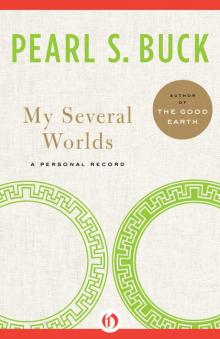 My Several Worlds
My Several Worlds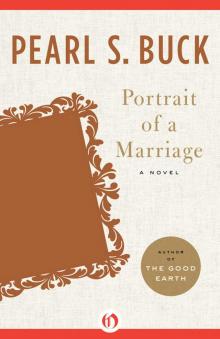 Portrait of a Marriage
Portrait of a Marriage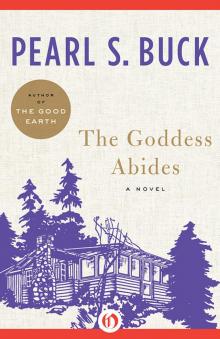 The Goddess Abides: A Novel
The Goddess Abides: A Novel Hidden Flower
Hidden Flower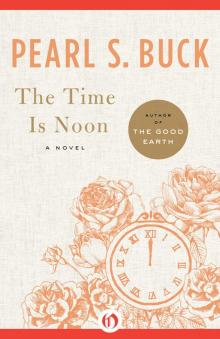 Time Is Noon
Time Is Noon